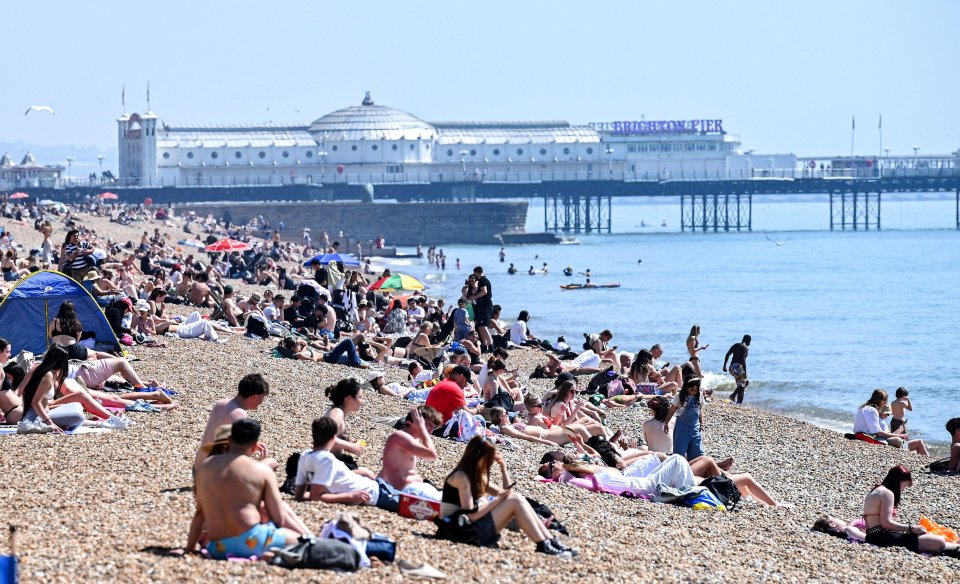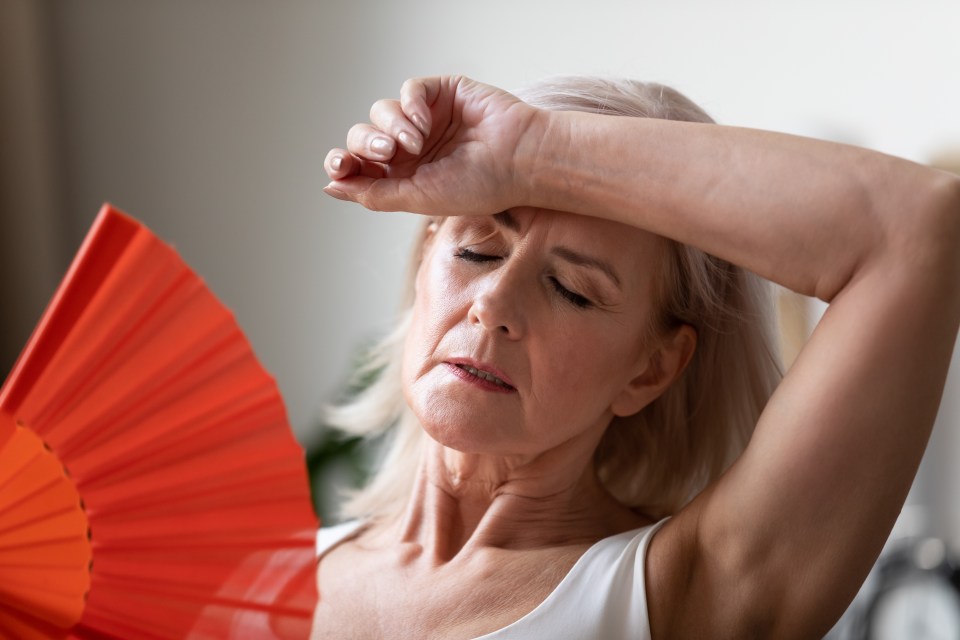AS the UK basks in soaring temperatures this week, no doubt you’re reaching for the sun cream and popping the antihistamines to ward off the pollen explosion.
But sunburn and hay-fever aren’t the only health concerns you need to be mindful of during the summer months.
For millions of Brits, there is a darker side to the glorious weather as the heat can interfere with some common medications – in some cases, with life-threatening consequences.
On Tuesday, the UK recorded its warmest day of the year so far, with temperatures reaching 24C in some places.
And forecasters say the current warm spell is far from over – with the Met Office predicting temperatures will reach 29C in parts of the UK today.
But for the 8 million of Brits taking medications like antidepressants, these high temperatures can turn their drugs from helpful to harmful.
Around 5 million of those are prescribed selective serotonin reuptake inhibitors (SSRIs), commonly used to treat conditions like depression and anxiety.
These drugs can be lifesaving for many – but they can also make the body more vulnerable to heat.
“They can stop the body from regulating temperature properly,” pharmacist Thorrun Govind tells Sun Health.
SSRIs, like fluoxetine and sertraline work by increasing serotonin levels in the brain – a natural chemical that regulates mood.
By upping the level of serotonin, these drugs can help make people feel happier.
But because these medications influence the brain’s chemicals, they also affect the hypothalamus, the part of the brain that acts as the body’s thermostat.
The build-up of serotonin can make the hypothalamus less effective at sending the signals needed to control body temperature.
“This can lead to excessive sweating,” Thorrun adds.
“This can be counterproductive in hot weather as the body is already struggling to cool down.”
Excess sweating can lead to dehydration and, paradoxically, a rise in body temperature.
Worryingly, another type of antidepressant, tricyclic antidepressants, can also affect brain function, making it harder to spot the early signs of overheating, like dizziness, confusion, or headaches.
You should always consult your doctor before making changes to your mental health medication
Dr Sameer Sanghvi
They can also make you sweat less as they block a chemical in the body that helps activate sweat glands, making it harder for your body to cool down.
“In some cases, this disruption can be life-threatening when your body struggles to cope with the soaring temperatures,” the medicine expert says.
One of the most serious risks of extreme heat is heat stroke – a medical emergency that occurs when the body overheats and can no longer cool itself down.
“I’ve actually experienced heat stroke myself, and it’s a real shock to the body – you feel completely out of it,” Thorrun adds.
Your internal body temperature typically stays around 37C, because that’s the range your organs need to function properly.
Heat stroke sets in when it rises to 40C or higher. This is when it can quickly become dangerous – leading to confusion, seizures, organ failure, and, in severe cases, death.
How to stay safe
“If you are taking these kinds of antidepressants, first things first, do not stop taking them,” Dr Sameer Sanghvi, a GP at LloydsPharmacy Online Doctor says.
“You should always consult your doctor before making changes to your mental health medication.”
The best thing people on these medicines can do is to take precautions, he says.
“Try to stay cool by sticking to the shade, drinking plenty of fluids and by avoiding alcohol,” Dr Sameer explains.
How to keep your medicines safe in the heat
By Dr Sameer Sanghvi
You also need to be mindful of where you’re storing your medications, especially in hot weather.
Heat, air, light and moisture can all damage your medicine and stop them working as they should.
Medications are likely to expire more quickly if not stored correctly too.
A drawer or cabinet is an ideal place to store medicine.
These tend to stay cool and dark, even in warm weather.
That said, I’d avoid keeping your medicine in bathroom cabinets as these can become very damp thanks to steam from baths and showers.
Unless advised otherwise, you should always keep medication in its original packaging.
Things like the box and blister packet that tablets come in are designed to protect the medicine inside so it can do its job effectively.
Alcohol can make you feel hotter because it dehydrates you and increases blood flow to the skin, making it harder for your body to cool down.
“You should also keep out of the sun between 11am and 3pm, avoid exercising in the hottest parts of the day and wear loose, breathable clothing,” he adds.
The 3 other drugs that can be dangerous in the heat
As temperatures rise, it’s not just antidepressants that can be affected by the heat.
“I’d say people probably aren’t aware of which medications they take are sensitive to warmer weather,” says Thorrun.
“Living in the UK, we’re more used to grabbing our umbrellas than worrying about how our medicines change in the sun,” she adds.
Here are some other common medications you might have at home that can pose similar risk:
1. Blood pressure drugs
Around 8 million people in the UK are on medication for high blood pressure, including diuretics and beta-blockers.
These drugs can make it harder for the body to handle heat because they affect fluid levels and heart rate.
“This makes it harder for the body to sweat and cool down,” explains Thorrun.
Diuretics, for example, make people need to pee more, leading to dehydration.
“Without enough fluid, your body can struggle to regulate its temperature, leaving you at greater risk of heat stress,” she adds.
2. ADHD meds
Medicines used to treat ADHD, or attention deficit hyperactivity disorder, can raise core body temperature.
This is particularly true for methylphenidate, which is one of the most commonly prescribed stimulant medications for ADHD.
“It can stop your body’s ability to cool itself,” says Thorrun.
This can make it more difficult to stay cool during hot weather, increasing the risk of overheating and heat stroke.
3. Antibiotics
Doxycycline is one of the UK’s most commonly prescribed antibiotics in the UK – typically dished out to treat skin conditions and infections such as acne.
However, it can make your skin more sensitive to sunlight, increasing the risk of sunburn and skin reactions – even after short bursts in the sun.
Thorrun says: “This is more about sunlight than heat, but it can still be dangerous in intense sun.”
Frequent sunburn means you are more likely to get skin cancer – which kills six Brits every day.
What are the symptoms of heatstroke?
IF you sit out in the sunshine for too long, you might experience something called “heat exhaustion”.
This is the body’s natural response to overheating, excessive loss of water and salt, usually through excessive sweating.
When this happens you may experience headache, dizziness and confusion, feeling sick and cramps – which can be easily mistaken for heatstroke.
However, for heat exhaustion, the NHS says your symptoms should clear within 30 minutes of cooling down.
Heatstroke, on the other hand, is more dangerous lasts for longer (but is thankfully, much less common).
There is cause for concern when you start to exhibit these five extreme symptoms, as they may be signs of heatstroke:
- Feeling confused
- Becoming unresponsive or losing consciousness
- Having a fit or seizure
- Having a temperature above 40C
- Having rapid or irregular breathing
The NHS recommends that you call 999 if you exhibit these symptoms.

















